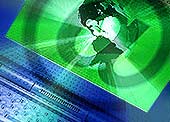 Computers will be found anywhere in the home, taking on various shapes and sizes that do not resemble the traditional computers of today. They could be a mobile phone, a baking oven, sunglasses, or even gloves… Integrating control devices and information management will be a crucial task for the computer manufacturing industry. People will connect to the Internet, and all activities will be carried out using computers, such as shopping, controlling construction robots, and operating cooking robots…
Computers will be found anywhere in the home, taking on various shapes and sizes that do not resemble the traditional computers of today. They could be a mobile phone, a baking oven, sunglasses, or even gloves… Integrating control devices and information management will be a crucial task for the computer manufacturing industry. People will connect to the Internet, and all activities will be carried out using computers, such as shopping, controlling construction robots, and operating cooking robots…
On the Internet, there will no longer be isolated and private networks; it will expand widely, allowing people to freely access the network without management over usage.
The Internet will change traditional communication methods, enabling individuals to connect through television, telephones, disc players, and all computers. Traditional forms of media and correspondence will gradually become obsolete. Computer data storage methods will also fade away, replaced by online data storage solutions.
People will be able to communicate and talk to each other as if they were meeting in person. Individuals can establish their own communication channels with others, similar to broadcasting television channels.
Using the Internet will be free; however, additional value-added services will incur charges, similar to the current model of pay television.
Advertising on the Internet will occur just like on television, happening anytime and anywhere.
Information stored online will be accessible for free, but storing that information will require payment.
Cable companies will partner with telephone companies to create a TV/telephone hybrid. This will provide users with entertainment and communication options through a TV receiver. This receiver will be linked to banks, allowing users to pay for services like phone calls or movie watching directly from their credit card accounts.




















































